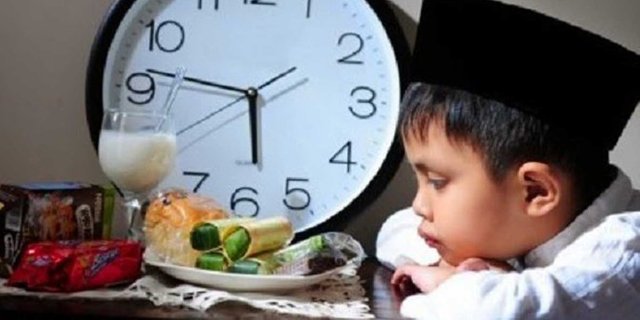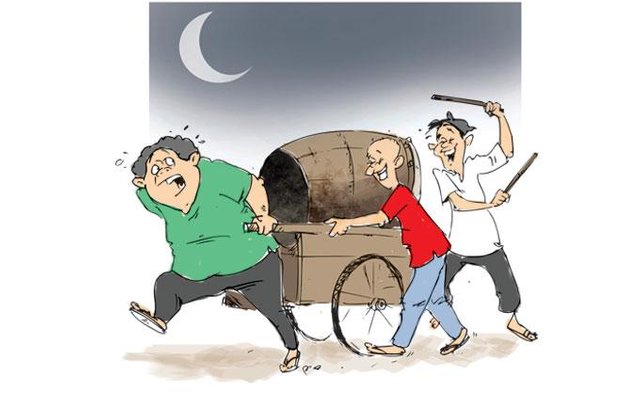Regarding the Law of Breaking Sharing Fast
"Open together" which if we see in the society has been entrenched, especially that often done in the month of Ramadan.
Goal Breaking Fast:
1.Reading the advice of the Prophet sallallaahu'alaihi wasallam:
من فطر صائما كان له مثل أجره غير أنه لا ينقص من أجر الصائم شيئا
"Whoever provides fasting meal for the fasted, then for him like a fasting reward without reducing even the fastest reward" HR. At-Tirmidhi
2.Turning Ramadan with good deeds
3.Turning the character of generosity in the month of Ramadan
- Strengthen the Ukhuwwah Islamiyyah rope among the Muslims.
- Helps to ease the burden of the Dhu'afa (Faqir-Miskin).
Benefits of Sharing Fasting Together
Breaking the fast together is certainly very good to fill the fasting. Open fasting as part of the activity in the month of Ramadan, is also an effort to reach the subhikmah fasting, which in breaking fast together also contained a more specific special wisdom.
Fasting in which social wisdom is present, such as the demands of tithe, through open together can be understood to reinforce that. Open together can be a social media, a means of worship that not only mahdhah but also worship ghairu mahdhoh.
Lots of benefits with the holding of fasting together, such as strengthening emotionality (ukhuwah), improve the spirit of helping others, the media fastabiqul Khairat (competing in the good) with in the open together there are activities of worship collectively, and others.
The existence of elements that make this break fasting has its own benefits in Ramadan, so position it as a good tradition that should continue to be preserved and improved quality.
Elements of Brethren in the Open Together.
Breaking the fast is collective (congregation) has elements ukhuwah (tightening silaturrahim fellow Muslims), all have a clear legal base and strong religion.
Prophet Saw himself asked his people to do ukhuwah as it is in a quite popular hadith, narrated by Bukhari-Muslim from the Companions of Ibn Umar,
"A Muslim siblings with other Muslims. He does not persecute, nor surrender it (to the enemy). Whoever meets the needs of his brother, God will also meet his needs. Whoever overshoot and a Muslim is a hardship, Allah will enlarge for him a difficulty also and the difficulties he faces in the future. Whoever closes the shame of a Muslim, Allah will cover his shame in the future. "
Thus, this activity is very useful and is expected to continue to exist. It would be better if breaking the fast together in the holy month of Ramadan is also improved quality and can be enjoyed by pilgrims on a wider scale.
The Law of Eating at the Mosque
Scholars differ on the law of eating in mosques. Here are the details of their opinion,
First, Syafiiyah and servants argue, may eat in the mosque.
An-Nawawi - ualam syafiiyah - says,
لا بأس بالأكل والشرب في المسجد ووضع المائدة فيه وغسل اليد فيه
"No why eat and drink in mosques, put food in mosques, and wash hands in mosques." (Al-Majmu 'Syarh Muhadzab, 2/174).
Al-Buhuti - the religious cleric - (w 1051 H) says,
لا بأس (بالأكل فيه) أي: في المسجد للمعتكف وغيره لقول عبد الله بن الحارث: «كنا نأكل على عهد النبي صلى الله عليه وسلم في المسجد الخبز واللحم» رواه ابن ماجه
"No problem eating in it, namely in the mosque, for people who i'tikaf and others. Based on the hadith of Abdullah bin Harith radhiyallahu 'anhu,' We eat bread and meat in the mosque, in the time of the Prophet sallallaahu 'alaihi wa sallam. "Ibn Majah's narration. (Kasyaf al-Qana ', 2/371).
Secondly, Malikiyah distinguishes between dry light meal with other food. They allow meals in the mosque for light and dry food, such as dates or anything else. While the food is heavier than that, it should not be eaten in the mosque, except in an emergency.
Imam Al-Baji - the Malikiyah cleric - (d 474 AH) says,
وأما الأكل في المسجد ففي المبسوط كان مالك يكره أكل الأطعمة اللحم ونحوه في المسجد, زاد ابن القاسم في العتبية: أو رحابه, وأما الصائم يأتيه من داره السويق وما أشبه ذلك, قال ابن القاسم: أو الطعام الخفيف فلا بأس به.
Eating at the mosque, described in al-Mabsuth, that Imam Malik hates eating meat or something in the mosque. Ibn al Qosim adds in al-Uthbiyah: 'Including also eating on the terrace of the mosque. While the fasting man, whom he was given Sawiq (dough and flour dough) or the like, or all of them.


Congratulations @isaw! You have completed some achievement on Steemit and have been rewarded with new badge(s) :
Click on any badge to view your Board of Honor.
To support your work, I also upvoted your post!
For more information about SteemitBoard, click here
If you no longer want to receive notifications, reply to this comment with the word
STOP